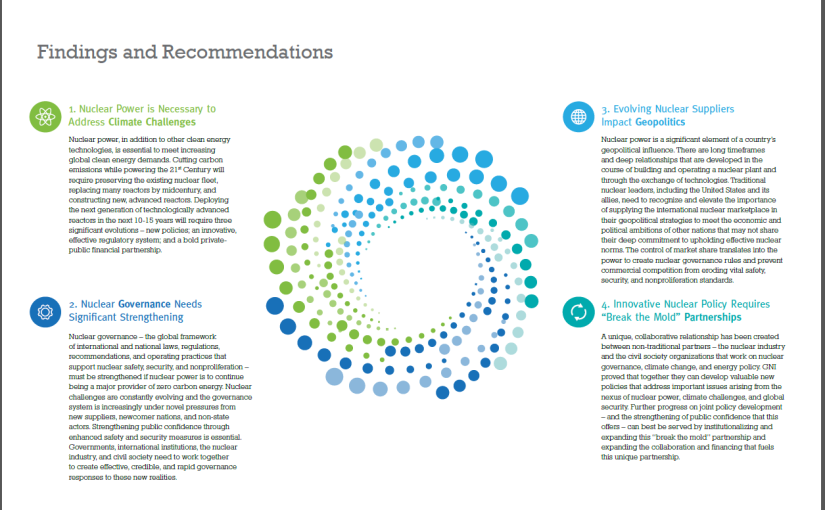Nuclear Energy’s Role in Fighting Climate Change Under Threat
Global Nexus Initiative Report Urges Changes in Technology Development and Nuclear Governance to Preserve Vital Role and Cope With Security Challenges
May 2, 2017 – Washington D.C. – Nuclear power is essential for addressing climate change, but significant changes are required in technology development and global governance in order to continue that vital role, according to a report released by the Global Nexus Initiative (GNI), a policy group that for the first time brought together experts from the nuclear industry and leading energy, climate change and nuclear security experts and organizations.
The GNI is a joint project of the Partnership for Global Security, a think-tank with a long history of offering innovative solutions to global nuclear security challenges, and the Nuclear Energy Institute, the nuclear energy industry’s policy organization.
Maria Korsnick, President and CEO of NEI, said: “America’s 99 nuclear reactors have a vital role to play when it comes to powering our economy, protecting the environment and supporting our nation’s influence around the world. GNI’s recommendations reflect a common interest in finding policy solutions to help keep our plants running, advance new designs and promote the role our nuclear suppliers play in generating jobs at home while strengthening America’s hand in global governance in the face of challenges abroad. We look forward to continuing our work with GNI on these important issues as we chart the future of our industry.”
Kenneth Luongo, President of the Partnership for Global Security, said: “GNI has responded to the realities of the complex global environment where the linkages between critical issues including climate change, nuclear power and international security require new responses and innovative partnerships. Nuclear power has an important role to play in tackling climate change, but there are governance and geopolitical challenges that need to be addressed. The GNI report focuses attention on the nexus of these issues and provides an actionable agenda for progress that will benefit the global community.”
Richard Meserve, former Chairman of the Nuclear Regulatory Commission and a member of the GNI working group, said: “This report draws attention to nuclear power’s geopolitical dimension, which often is overlooked in the debate. The nuclear rules are shaped by the countries with the largest market share, and traditional leaders like the US will soon be overtaken by China and Russia. There is a danger that the U.S. will lose the capacity to influence the global norms for safety, security and non-proliferation. There thus are national security issues at stake.”
Armond Cohen, Executive Director of the Clean Air Task Force and a member of the GNI working group, said: “Nuclear energy has increasingly come forward as a climate change management tool as we realize how deep and fast carbon cuts need to happen. Nuclear can be part of a portfolio approach – along with renewables, carbon capture and sequestration and improvements in efficiency – that gives us multiple options to decarbonize the electricity sector and sustain economic growth. But developing nuclear energy at sufficient scale and speed will require both technical innovation and close cooperation among industry, international regulatory bodies, civil society and public and private investors. I look forward to the GNI’s involvement in that process in the months ahead.”
Recommendations
The report, “Nuclear Power for the Next Generation: Addressing Energy, Climate and Security Challenges,” addresses critical issues around climate policy, nuclear technology and global security. Its principal recommendations are:
- Nuclear power is necessary to address climate change
- Nuclear governance needs significant strengthening
- Evolving nuclear suppliers impact geopolitics
- Innovative nuclear policy requires “break the mold” partnerships
The full report is available here, and additional information can be found on the GNI website: www.globalnexusinitiative.org.
About the Global Nexus Initiative
Formed in 2015, the Global Nexus Initiative (GNI) brings together for the first time leading experts from the nuclear industry, nuclear security and environmental communities to examine the complex challenges posed by the intersection of climate change, energy demand and global security. The GNI is co-sponsored by the Partnership for Global Security and the Nuclear Energy Institute.
Media Briefing
A briefing for the media will take place at the National Press Club on May 2 at 12:00pm ET, with a simultaneous webcast. For further information or to reserve a place at the briefing please contact: mmp@nei.org.
Media Contacts
Partnership for Global Security
Kenneth Luongo – kluongo@partnershipforglobalsecurity.org
Richard Mahony – richard@mahonypartners.com
Nuclear Energy Institute
John Keeley – jmk@nei.org

